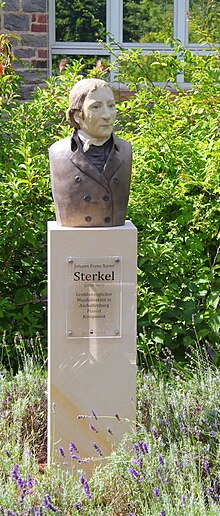Franz Xaver Sterkel

Johann Franz Xaver Sterkel (born December 3, 1750 in Würzburg , † October 21, 1817 there ) was a German pianist and composer .
Life
Sterkel studied from 1768 theology and worked during which as organist at Neumunster , where he in 1778 vicar was. Because of his compositions, Sterkel was appointed court musician by the Elector and Archbishop of Mainz , Friedrich Karl Joseph von Erthal . After a trip to Italy (1779–1782), Sterkel was finally appointed canon to Mainz in 1785 , and in 1793 he succeeded Vincenzo Righini, who had been appointed to Berlin, as the electoral conductor. After Erthal's death in 1802, Sterkel directed the court music in Aschaffenburg for Prince and Archbishop Karl Theodor von Dalberg . When he lost his secular rule, the Grand Duchy of Frankfurt , in 1814 , Sterkel returned to Würzburg and died there three years later.
On September 3, 1791, after a performance in Mergentheim , the young Ludwig van Beethoven traveled to Aschaffenburg, a summer residence of the elector, to visit the famous pianist Sterkel. It is said that Beethoven was impressed by Sterkel's playing, and it is believed that his style influenced some of Beethoven's early piano compositions. Conversely, to Sterkel's surprise, Beethoven was not only capable of playing his Righini variations, but also spontaneously improvising other variations in a similar style. On February 11, 1811, Carl Maria von Weber visited the "famous Sterkel" in Aschaffenburg.
title
- Capitular of the Liebfrauenstift in Mainz
- Elector of the Mainz court chaplain
- Hofkapellmeister of the Elector and Archbishop of Mainz ( Kurmainz )
- Head of the Grand Ducal Frankfurt Court Music in Aschaffenburg
- Royal Bavarian Kapellmeister
- Music school director in Aschaffenburg
plant
Sterkel published an opera ( Farnace , 1782), ten symphonies , two orchestral overtures , as well as various chamber music , sacred music as well as German and Italian-language vocal music . He also left behind an extensive piano work for two and four hands. Today, however, Sterkel's work has no significant presence either in recordings or in concerts.
literature
- Peter Hollfelder : The piano music. Nikol Verlagsgesellschaft, new edition 1999, ISBN 3-933203-12-0 .
- Hans Michel Schletterer : Sterkel, Johann Franz Xaver . In: Allgemeine Deutsche Biographie (ADB). Volume 36, Duncker & Humblot, Leipzig 1893, pp. 103-106.
- Axel Beer, Dagmar Schnell: Johann Franz Xaver Sterkel's correspondence with his publishers . Schott, Mainz a. a. 2001. ISBN 3-7957-1338-2
- Joachim Fischer: Johann Franz Xaver Sterkel (1750 - 1817) - thematic-bibliographical catalog raisonné . VDS, Neustadt an der Aisch. 2014, ISBN 978-3-87707-923-2 .
- Axel Beer, Günter Wagner: Sterkel, Johann Franz Xaver. In: Ludwig Finscher (Hrsg.): The music in past and present . Second edition, personal section, volume 15 (Schoof - Stranz). Bärenreiter / Metzler, Kassel et al. 2006, ISBN 3-7618-1135-7 ( online edition , subscription required for full access)
Web links
- Sheet music and audio files by Franz Xaver Sterkel in the International Music Score Library Project
- Short biography on the website of the city of Aschaffenburg
- Vita, works and work on the homepage of the JFX Sterkel Society Aschaffenburg
- Song portal
- Franz Xaver Sterkel in the Internet Archive
Individual evidence
- ↑ See Klaus Martin Kopitz , Rainer Cadenbach (Ed.) U. a .: Beethoven from the point of view of his contemporaries in diaries, letters, poems and memories. Volume 2: Lachner - Zmeskall. Edited by the Beethoven Research Center at the Berlin University of the Arts. Henle, Munich 2009, ISBN 978-3-87328-120-2 , pp. 785 and 906f.
- ^ Josef Wirth, Aschaffenburg with a time table on the history up to 1850, Paul Pattloch Verlag Aschaffenburg 1948
- ↑ Biography on "Grande Musica"
| personal data | |
|---|---|
| SURNAME | Sterkel, Franz Xaver |
| ALTERNATIVE NAMES | Sterkel, Johann Franz Xaver |
| BRIEF DESCRIPTION | German pianist and composer |
| DATE OF BIRTH | December 3, 1750 |
| PLACE OF BIRTH | Wurzburg |
| DATE OF DEATH | October 21, 1817 |
| Place of death | Wurzburg |

